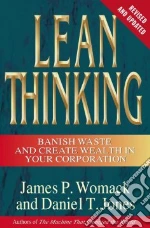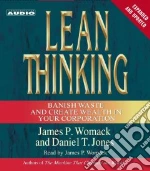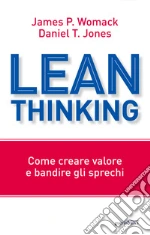 Libri di Jones Dan su Unilibro.it
)
Libri di Jones Dan su Unilibro.it
)
|
|
2003 |
 Title :
Weird Tales from the Storyteller
Title :
Weird Tales from the StorytellerAuthor: Morden Daniel, Jones Jac (ILT) Publisher: Paul & Co Pub Consortium € 10,00
|
 Title :
Lean Thinking
Title :
Lean ThinkingAuthor: Womack James P., Jones Daniel T. Publisher: Free Pr Expanded, updated, and more relevant than ever, this bestselling business classic by two internationally renowned management analysts describes a business system for the twenty-first century that supersedes the mass production system of Ford, the financial control system of Sloan, and the strategic system of Welch and GE. It is based on the Toyota (lean) model, which combines operational excellence with value-based strategies to produce steady growth through a wide range of economic conditions. In contrast with the crash-and-burn performance of companies trumpeted by business gurus in the 1990s, the firms profiled in Lean Thinking -- from tiny Lantech to midsized Wiremold to niche producer Porsche to gigantic Pratt & Whitney -- have kept on keeping on, largely unnoticed, along a steady upward path through the market turbulence and crushed dreams of the early twenty-first century. Meanwhile, the leader in lean thinking -- Toyota -- has set its sights on leadership of the global motor vehicle industry in this decade. Instead of constantly reinventing business models, lean thinkers go back to basics by asking what the customer really perceives as value. (It's often not at all what existing organizations and assets would suggest.) The next step is to line up value-creating activities for a specific product along a value stream while eliminating activities (usually the majority) that don't add value. Then the lean thinker creates a flow condition in which the design and the product advance smoothly and rapidly at the pull of the customer (rather than the push of the producer). Finally, as flow and pull are implemented, the lean thinker speeds up the cycle of improvement in pursuit of perfection. The first part of this book describes each of these concepts and makes them come alive with striking examples. Lean Thinking clearly demonstrates that these simple ideas can breathe new life into any company in any industry in any country. But most managers need guidance on how to make the lean leap in their firm. Part II provides a step-by-step action plan, based on in-depth studies of more than fifty lean companies in a wide range of industries across the world. Even those readers who believe they have embraced lean thinking will discover in Part III that another dramatic leap is possible by creating an extended lean enterprise for each of their product families that tightly links value-creating activities from raw materials to customer. In Part IV, an epilogue to the original edition, the story of lean thinking is brought up-to-date with an enhanced action plan based on the experiences of a range of lean firms since the original publication of Lean Thinking. Lean Thinking does not provide a new management 'program' for the one-minute manager. Instead, it offers a new method of thinking, of being, and, above all, of doing for the serious long-term manager -- a method that is changing the world. € 31,20
|
 Title :
Reputable Conduct
Title :
Reputable ConductAuthor: Jones John R., Carlson Daniel P. Publisher: Pearson College Div This book looks at the peculiar ethical demands in the policing and corrections professions, with particular emphasis on sub-cultural constraints, and how loyalty to colleagues can sometimes cause a sacrifice of individuality. It contains a unique discussion on whether ethics can be taught, covers sensitive, real-life moral dilemmas and the ever-increasing ethical demands placed upon police and corrections professionals. For Chiefs of Police, Jail Wardens/Superintendents, and Principals of Justice Academies. € 93,90
|
 Title :
Lean Thinking (CD Audiobook)
Title :
Lean Thinking (CD Audiobook)Author: Womack James P., Jones Daniel T. Publisher: Simon & Schuster Lean Thinking begins by helping listeners to identify value, asking, 'What does the customer really want?' instead of 'What can we try to convince the customer to accept?' Lean thinkers then identify the value stream -- every step required to move a specific good or service from initial concept into the hands of the customer -- for each product and ask if each step really creates value. Those that don't -- the great majority -- are then removed, and the remaining steps are conducted in continuous flow at the pull of the customer, as the firm manages toward perfection. As a consequence, lead times, costs of all sorts, and defects shrink, while responsiveness to customer needs and selling prices increase. In an economic downturn, many companies are searching desperately for a sustainable formula for renewed growth and success. Lean Thinking is that formula -- a proven blueprint and specific action plan that will help any company stabilize its position and grow steadily while better serving its customers, employees, suppliers, and investors. € 26,80
|
 Title :
The Poems of Dylan Thomas
Title :
The Poems of Dylan ThomasAuthor: Thomas Dylan, Thomas Dylan (NRT), Jones Daniel (EDT) Publisher: New Directions This new, revised edition of The Poems of Dylan Thomas is based on the collection edited by Thomas's life-long friend and fellow poet, Daniel Jones, first published by New Directions in 1971. Jones started with the ninety poems Thomas selected for his Collected Poems in 1952 (at a time when the poet expected that many years of work still lay ahead of him) and, after exhaustive research and consideration, added one hundred previously finished, though uncollected, poems (including twenty-six juvenile works), and two unfinished poems, and arranged them all in chronological order of composition, creating the most complete edition of Thomas's poems ever published. This revised edition contains all the original material and incorporates textual corrections. Also included are an introduction and concise notes by Daniel Jones, a brief chronology of the poet's life, and a compact disc containing vintage recordings of Thomas reading eight of his poems in his famous 'Welsh-singing' style, making this edition of The Poems of Dylan Thomas a truly remarkable collection. € 32,70
|
|
|
2000 |
 Title :
Lean thinking. Come creare valore e bandire gli sprechi
Title :
Lean thinking. Come creare valore e bandire gli sprechiAuthor: Womack James P.; Jones Daniel T. Publisher: Guerini Next I manager hanno perso di vista il valore per il cliente e il modo in cui crearlo: concentrandosi sulle organizzazioni esistenti e su definizioni di valore obsolete essi generano sprechi su sprechi, mentre le economie dei paesi più avanzati rischiano la stagnazione. Il pensiero snello aiuta a definire precisamente il valore dei singoli prodotti, a identificare il flusso di valore per ciascun prodotto, a far sì che questo flusso scorra senza interruzioni e il cliente 'tiri' il valore dal produttore e a perseguire, infine, la perfezione. Questi semplici principi, descritti attraverso esempi, possono immettere nuova linfa vitale nelle aziende di qualunque settore. Lean Thinking non fornisce un nuovo programma manageriale per 'one-minute manager'. Esso offre, piuttosto, un nuovo modo di ragionare, essere e agire ai manager seri, quelli che cambieranno il mondo. € 38,00
Scontato: € 36,10
|
|
|
1999 |
 Title :
You Have to Stand for Something, or You'll Fall for Anything
Title :
You Have to Stand for Something, or You'll Fall for AnythingAuthor: Jones Star, Paisner Daniel Publisher: Textstream € 17,20
|
 Title :
Celebrating President's Day
Title :
Celebrating President's DayAuthor: Jordano Kimberly, Callella-Jones Trisha, Kupperstein Joel (EDT), Lyon Tammie (ILT) Publisher: Creative Teaching Pr Explains the meaning behind Presidents' Day and about the role of a president. € 2,70
|

|

|

|